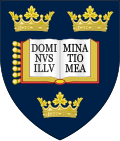Biography
Ryan was born on 9 May 1940 in London, England. He was educated at Christ's Hospital, [6] [7] Balliol College, Oxford, and University College, London. Elected a fellow of New College in 1969, he later taught at Princeton University, and returned to New College, Oxford, in 1996 to take up the Wardenship. He was made a Fellow of the British Academy in 1986.
A political theorist and historian of political thought, Ryan is a recognized authority on the development of modern liberalism, especially the work of John Stuart Mill, having contributed directly to the 'Reversionary' school, which led to a re-examination of Mill's work from the 1970s. His academic work also takes in broader themes in political theory, including the philosophy of social science, the nature of property, the history of political thought, and liberalism of the 19th and 20th centuries.
Ryan has held positions at the Universities of Oxford, Essex, Keele and Princeton University and University of Virginia School of Law. [3] He was also a Visiting Professor of Political Science at The University of Texas at Austin, Australian National University, The New School and many others.
Ryan is a regular contributor to The New York Review of Books , the London Review of Books , and The Times Literary Supplement , and continues to write on political theory and the history of political thought. [8]
This page is based on this
Wikipedia article Text is available under the
CC BY-SA 4.0 license; additional terms may apply.
Images, videos and audio are available under their respective licenses.
